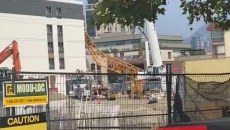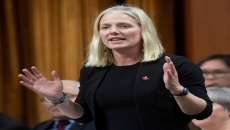Cooler temperatures gave firefighting crews in British Columbia some reprieve on Friday as most wildfires burned in the southern half of the province.
Karley Desrosiers, fire information officer with the BC Wildfire Service, said 275 fires were burning Friday, down from about 300 earlier in the week.
"In the last 24 hours we're at less than 20 fires (started) whereas in the previous weeks they were sitting at 25 to 40 fires per day," she said.
Almost 2,500 square kilometres of land was burning in the southeastern part of B.C., Desrosiers said.
About five per cent of the fires were caused by human activity while the rest were attributed to lightning, Desrosiers said, noting 40 per cent of fires in an average year are linked to humans while lightning is to blame for the remainder.
There were 58 evacuation orders in place by late Friday afternoon affecting more than 5,000 properties. Almost 17,500 properties were on evacuation alert, meaning those residents were told to be ready to leave on short notice.
Evacuation alerts covering the resort municipality of Sun Peaks and several surrounding areas north of Kamloops were lifted as crews worked to contain a nine-square kilometre blaze. Elsewhere, an evacuation order posted earlier this week in southeastern B.C. for nearly 200 properties along the Slocan River was downgraded to an alert for most residents.
Drive BC, an online travel information system, said Highway 1 north of Hope had reopened, three weeks after it was cut off by a wildfire that destroyed the village of Lytton. Desrosiers said that wildfire was a 156-square kilometre blaze and was still aggressive on its northern flank, prompting evacuation orders for the community of Spences Bridge and surrounding First Nations.
Evacuation orders were also expanded around the roughly 20-square kilometre Nk'Mip Creek fire in the south Okanagan and another burning at the north end of Shuswap Lake, north of Sicamous.
More than 100 firefighters from Quebec were set to arrive in B.C. on Friday and head to the Okanagan region, while a crew of 100 from Mexico is due on the weekend. A Canadian Armed Forces contingent was also in the Okanagan before being deployed to various fires.






